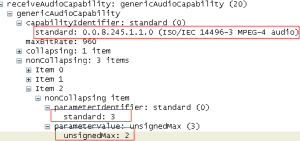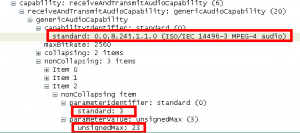This is a guide for analysis H.245 terminalCapabilitySet and figure out does the terminal supports AAC LC or AAC LD?
- First capture the call and it's communication packages, KDV1000-HUAWEI.pcap.
- Open KDV1000-HUAWEI.pcap with wireshark.
- Filter the KDV1000-HUAWEI.pcap with H225||H245
- Locate & expand the terminalCapabilitySet
- Find the items from capabilityTable which capabilityIdentifier is 0.0.8.245.1.1.0 (ISO/IEC 14496-3 MPEG-4 audio)
- There will be two items if your terminal supports both AAC LC & AAC LD.
- Find parameterIdentifier: standard which value is 3, check parameterValue: unsignedMax.
And here are sample items: If the value is 2 then its an AAC LC capability.  If the value is 23, then its an AAC LD capability.
If the value is 23, then its an AAC LD capability. 
How to build AAC LC parameters PVT tree:
[code]
childId = pvtBuildByPath(valH, tempId, "0", 0, NULL);
__pvtBuildByFieldIds(tempId1, valH, childId, {_h245(parameterIdentifier) LAST_TOKEN}, 0, NULL);
__pvtBuildByFieldIds(tempId2, valH, tempId1, {_h245(standard) LAST_TOKEN}, 4, NULL);
__pvtBuildByFieldIds(tempId1, valH, childId, {_h245(parameterValue) LAST_TOKEN}, 0, NULL);
// aac-lc(2)(bit:5) + sampling(bit:4) + chnl(bit:4) + resv(bit:3)
u8 bySampleFeq = (u8)ptAacCap->GetSampleFreq();
u8 byChnl = (u8)ptAacCap->GetChnl();
s8 abyBuf[2];
abyBuf[0] = (2<<3) | ((bySampleFeq&0xF)>>1);
abyBuf[1] = ((bySampleFeq&0x01)<<7) | (byChnl<<3);
__pvtBuildByFieldIds(tempId2, valH, tempId1, {_h245(octetString) LAST_TOKEN}, 2, abyBuf);
[/code]
How to build AAC LD parameters PVT tree:
[code]
//muxConfigPresent
childId = pvtBuildByPath(valH, tempId, "0", 0, NULL);
__pvtBuildByFieldIds(tempId1, valH, childId, {_h245(parameterIdentifier) LAST_TOKEN}, 0, NULL);
__pvtBuildByFieldIds(tempId2, valH, tempId1, {_h245(standard) LAST_TOKEN}, 6, NULL);
__pvtBuildByFieldIds(tempId1, valH, childId, {_h245(parameterValue) LAST_TOKEN}, 0, NULL);
__pvtBuildByFieldIds(tempId2, valH, tempId1, {_h245(logical) LAST_TOKEN}, 0, NULL);
//streamMuxConfig
childId = pvtBuildByPath(valH, tempId, "0", 0, NULL);
__pvtBuildByFieldIds(tempId1, valH, childId, {_h245(parameterIdentifier) LAST_TOKEN}, 0, NULL);
__pvtBuildByFieldIds(tempId2, valH, tempId1, {_h245(standard) LAST_TOKEN}, 8, NULL);
__pvtBuildByFieldIds(tempId1, valH, childId, {_h245(parameterValue) LAST_TOKEN}, 0, NULL);
u8 bySampleFeq = (u8)ptAacCap->GetSampleFreq();
u8 byChnl = (u8)ptAacCap->GetChnl();
s8 abyBuffMuxConf[7] = {0};
abyBuffMuxConf[0] = 65;
abyBuffMuxConf[1] = (23>>4);
abyBuffMuxConf[2] = ((23&0xf)<<4) | (bySampleFeq&0xf);
abyBuffMuxConf[3] = ((byChnl&0xf)<<4) | 10&0xf;
abyBuffMuxConf[4] = 0;
abyBuffMuxConf[5] = 0;
abyBuffMuxConf[6] = 0;
__pvtBuildByFieldIds(tempId2, valH, tempId1, {_h245(octetString) LAST_TOKEN}, 7, abyBuffMuxConf);
//errorProtection_SpecificConfig
childId = pvtBuildByPath(valH, tempId, "0", 0, NULL);
__pvtBuildByFieldIds(tempId1, valH, childId, {_h245(parameterIdentifier) LAST_TOKEN}, 0, NULL);
__pvtBuildByFieldIds(tempId2, valH, tempId1, {_h245(standard) LAST_TOKEN}, 9, NULL);
__pvtBuildByFieldIds(tempId1, valH, childId, {_h245(parameterValue) LAST_TOKEN}, 0, NULL);
s8 abyBufError[3] = {0};
__pvtBuildByFieldIds(tempId2, valH, tempId1, {_h245(octetString) LAST_TOKEN}, 3, abyBufError);
//add end
childId = pvtBuildByPath(valH, tempId, "0", 0, NULL);
__pvtBuildByFieldIds(tempId1, valH, childId, {_h245(parameterIdentifier) LAST_TOKEN}, 0, NULL);
__pvtBuildByFieldIds(tempId2, valH, tempId1, {_h245(standard) LAST_TOKEN}, 4, NULL);
__pvtBuildByFieldIds(tempId1, valH, childId, {_h245(parameterValue) LAST_TOKEN}, 0, NULL);
// aac-lc(2)(bit:5) + sampling(bit:4) + chnl(bit:4) + resv(bit:3)
bySampleFeq = (u8)ptAacCap->GetSampleFreq();
byChnl = (u8)ptAacCap->GetChnl();
s8 abyBuf[2];
abyBuf[0] = (23<<3) | ((bySampleFeq&0xF)>>1);
abyBuf[1] = ((bySampleFeq&0x01)<<7) | (byChnl<<3);
__pvtBuildByFieldIds(tempId2, valH, tempId1, {_h245(octetString) LAST_TOKEN}, 2, abyBuf);
[/code]
Code used to paser(demux) AAC LC parameter
[code]
// aac-lc(2)(bit:5) + sampling(bit:4) + chnl(bit:4) + resv(bit:3)
u8 bySampleFeq = ((abyConfig[0]&0x07)<<1) | ((abyConfig[1]&0x80)>>7);
u8 byChnl = ((abyConfig[1]&0x78)>>3);
[/code]
how we can listen by phone and mpeg4 audio programs?
Sorry, your question is…..
BTW: MPEG4 audio has been supported by all the lately manufactured smart phone. It wouldn’t be an issue for you if you send the audio in a proper way with a proper protocol to your phone.